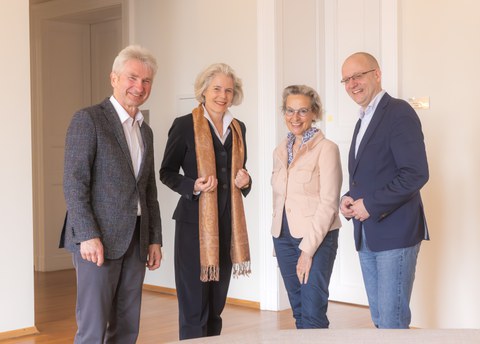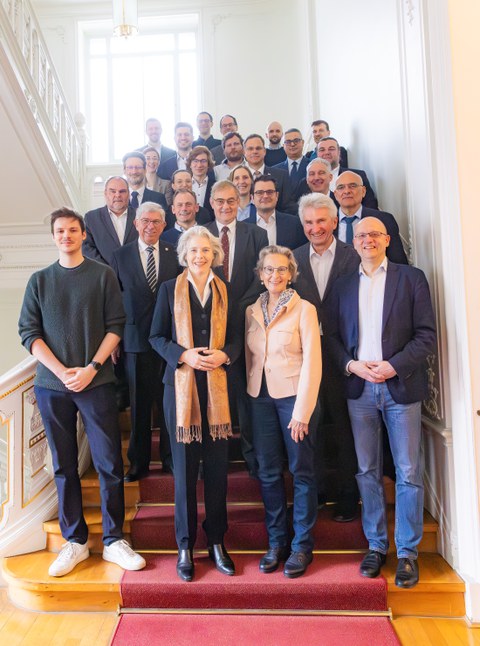11.04.2025
TUD gründet gemeinsam mit Hochschulen aus Sachsen und Thüringen die „Startup Campus Alliance“: TUD|excite wird gemeinsame Interessenvertretung koordinieren

Sie freuen sich über die Gründung: Prof. Andreas Pinkwart (TUD|excite), Prof. Eva Inés Obergfell (Rektorin Universität Leipzig), TUD-Rektorin Prof.in Ursula Staudinger und Prof. Utz Dornberger (Vorsitzender der "Startup Campus Alliance").
Acht sächsische und zwei thüringische Hochschulen – darunter die Technische Universität Dresden (TUD) – haben am 9. April 2025 die „Startup Campus Alliance“ gegründet. Sie wollen mit dem Verein Unternehmertum und Gründungskultur nachhaltig fördern sowie Sachsen und Thüringen als führende Deep-Tech-Gründungsregion in Deutschland etablieren.
Deep Tech (kurz für „Deep Technology“) steht für Technologien und Unternehmen, die Lösungen auf der Grundlage erheblicher wissenschaftlicher oder technischer Innovationen anbieten.
Die Gründungsmitglieder der „Startup Campus Alliance“ sind:
- Universität Leipzig
- Technische Universität Dresden
- Technische Universität Chemnitz
- TU Bergakademie Freiberg
- Hochschule für Technik und Wirtschaft Dresden
- Hochschule für Technik, Wirtschaft und Kultur Leipzig
- Hochschule Mittweida
- HHL Leipzig Graduate School of Management
- Friedrich-Schiller-Universität Jena
- Ernst-Abbe-Hochschule Jena
Die „Startup Campus Alliance“ will die Kräfte der Hochschulen in Sachsen und Thüringen im Bereich Gründungsförderung strategisch bündeln und dadurch wirksame Synergien schaffen. Durch gemeinsame Lehrformate, geteilte Infrastruktur und interdisziplinäre Zusammenarbeit entstehen innovative Unterstützungsangebote für gründungsinteressierte Talente und Teams.
Ein zentraler Bestandteil der Allianz ist es, Erfolge im Bereich der Hochschulausgründungen sichtbar zu machen und so die öffentliche Wahrnehmung der Gründungsstandorte Sachsen und Thüringen zu stärken – national wie international. „Darüber hinaus trägt die hochschulübergreifende Kooperation wesentlich zur Weiterentwicklung des regionalen Startup-Ökosystems bei. Immerhin kommen bereits jetzt die meisten Gründungsideen aus den Hochschulen“, sagt der Leipziger Universitätsprofessor Utz Dornberger, der zum Vorsitzenden des Vereins gewählt wurde. In Sachsen habe es 2023 knapp 100 Startup-Neugründungen gegeben, mehr als 60 davon seien auf Gründungsprojekte aus den Hochschulen und Forschungseinrichtungen zurückzuführen.
„Mit der Gründung der Startup Campus Alliance schaffen wir eine weitere Säule zur Unterstützung eines innovativen und nachhaltigen Startup-Ökosystems auf der Grundlage einer starken Partnerschaft zwischen Wirtschaft, Verbänden und Hochschulen“, erläutert Prof.in Ursula Staudinger, Rektorin TUD. „Dieser Schritt steht im Einklang mit unseren Aktivitäten im Rahmen unseres Exzellenzcenter für Innovation, Transfer und Entrepreneurship TUD|excite zur Wertschöpfung durch Ausgründungen sowie Innovations- und Transferprojekte beizutragen. Als patentstärkste Universität in Deutschland bringt die TUD sehr gern ihre Expertise in diese Allianz ein.“
Organisatorische Basis für die Zusammenarbeit ist der gemeinnützige Verein „Startup Campus Alliance“. Der Verein dient als koordinierende Plattform, über die die vielfältigen Aktivitäten der hochschulischen Gründungsförderung effizient gebündelt und strategisch ausgerichtet werden können.
Zudem ermöglicht die Vereinsstruktur eine gemeinsame Interessenvertretung in der Business Opportunities Ost (boOst) Ecosystem gGmbH, welche sich parallel zur Etablierung der Allianz gerade in Gründung befindet. Neben den Sparkassen in Sachsen, dem SpinLab in Leipzig und der TUDAG werden aktuell noch Gespräche mit weiteren privaten Kapitalgebern geführt. Diese starke Partnerschaft soll die Gründung innovativer Startups aus den Hochschulen heraus unterstützen.
Der Aufbau und die Gründung der boOst gGmbH sowie die Einwerbung weiterer privater Partner wird durch das Excellence Center TUD|excite als Transferzentrum der TUD federführend geleitet.
Die boOst gGmbH bewirbt sich im Wettbewerb „Startup Factories“ des Bundesministeriums für Wirtschaft und Klimaschutz, der ausgewählte deutsche Startup-Ökosysteme beim Aufbau wissensbasierter Ausgründungen unterstützt. Darin soll ein Modell für eine thematisch bzw. regional ausgerichtete „Startup Factory“ entwickelt werden, die als privatrechtliche Organisation außerhalb des Hochschulrahmens agiert.


